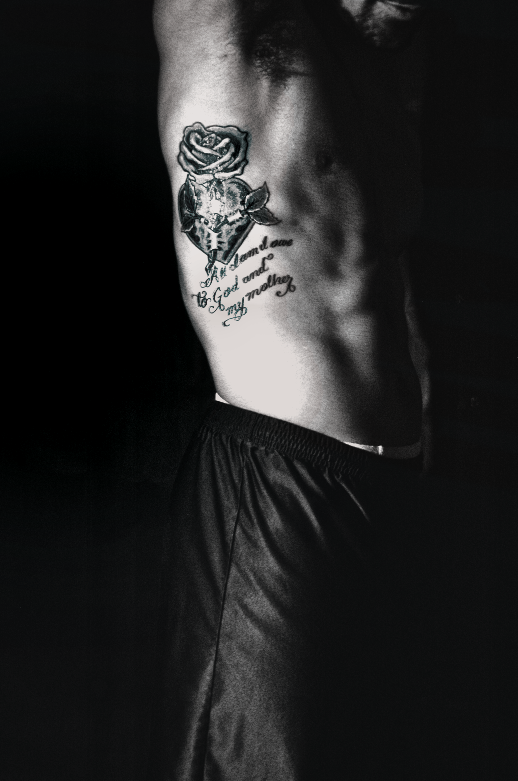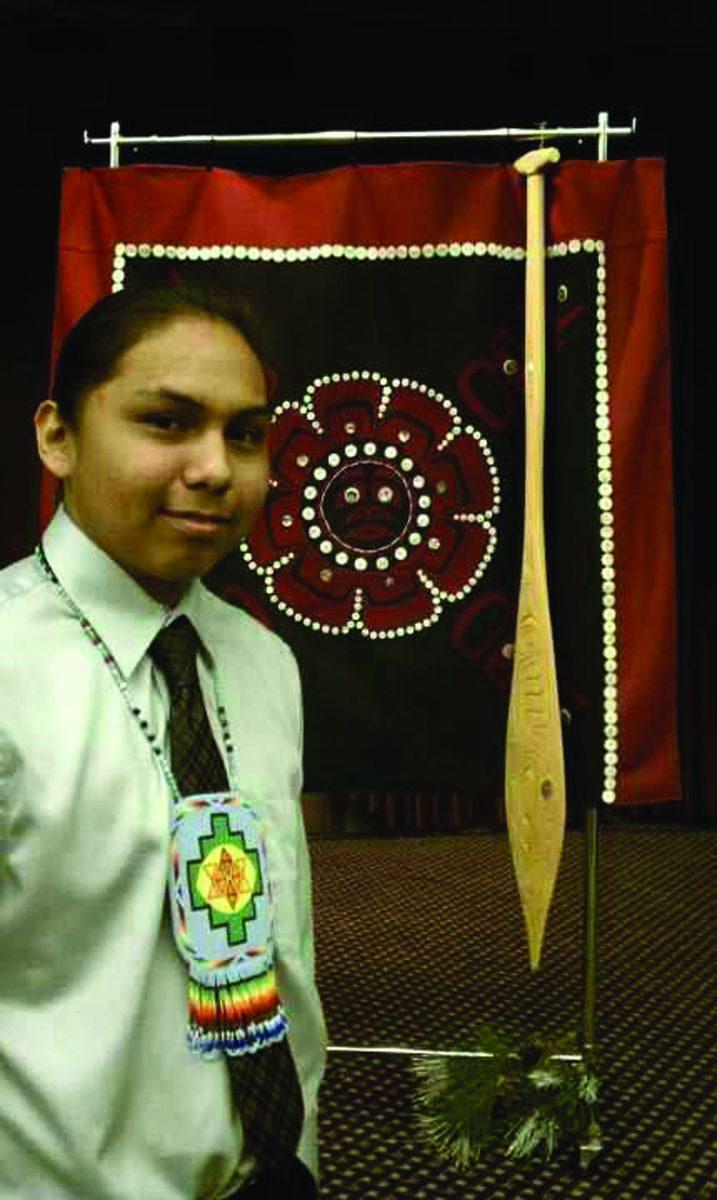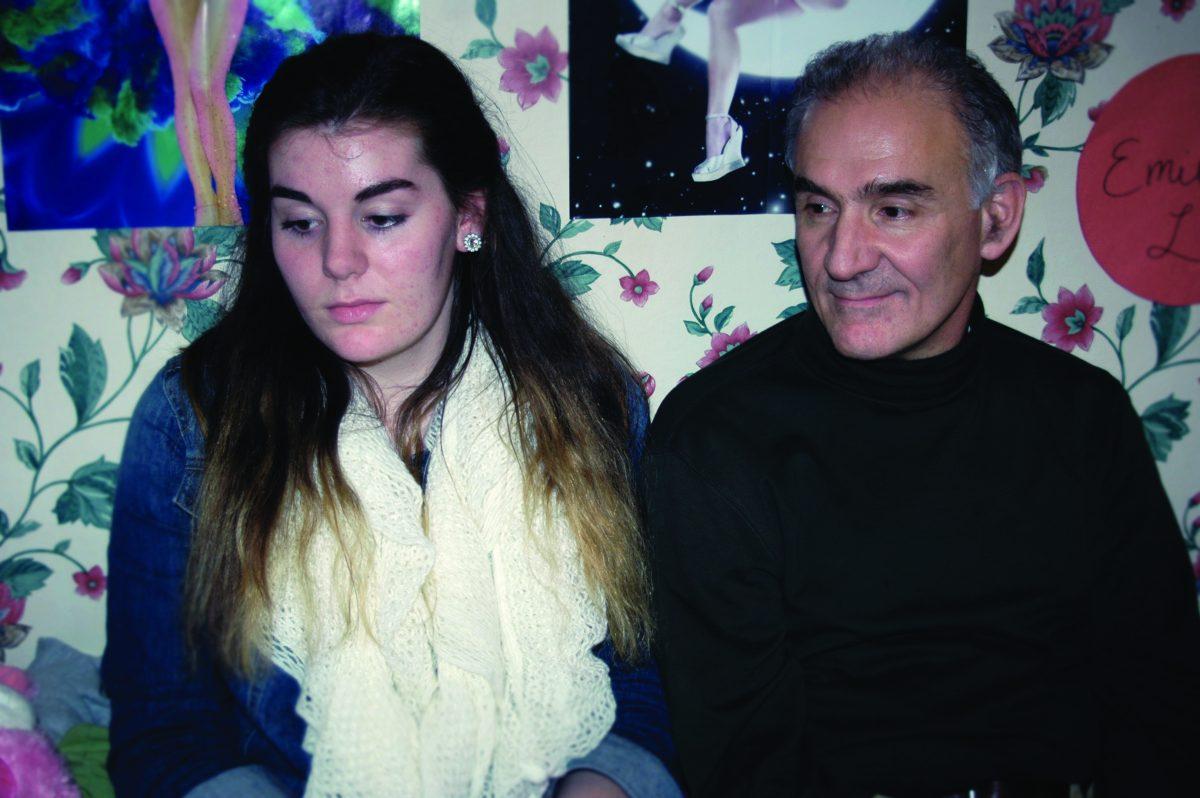Grant High School senior Joey Piazza remembers when the needle first punctured his skin as he sat in an Arizona tattoo parlor. He was getting his first tattoo – a religious cross on his right shoulder – to represent his dedication to Jesus and Christianity. About a year later, he got an image of a lion on his left shoulder at someone’s house.
“The first time I was a little nervous. But it didn’t hurt too bad,” Piazza says. “I don’t think I’m going to change my religion, that’s why I got it tattooed. My dad thought it was stupid. But I have known that I wanted to get one for a couple years. It’s a way for me to show my true colors.”
As a freshman, Ian Johnston begged his mother, who has tattoos herself, to allow him to get inked. When she finally agreed, he went to a shop where a close friend’s uncle did tattoos. He got his mother’s initials put on the back of his arms – an “I” on one tricep and a “J” on the other. “My mom is really important to me and I wanted to express how much I love her,” says Johnston, now a junior.
For some students, getting a tattoo has risen in the ranks of rites of passage, right up there with having the latest cell phone or getting a drivers license. Though it’s illegal for minors to get tattooed in Oregon, teens at Grant and beyond are turning to the body art as a way to make a statement.
So what’s drawing high schoolers to get tattoos at such a young age? Pop culture plays a big part. Look around any playing field or sports arena and the latest athletes are inked up more than ever. Movie stars and starlets on Hollywood’s red carpet are as choosy about their tattoos as they are about the latest fashion they wear.
But while tattoos may make a statement, they also come at a risk, especially for young people who often go underground to get theirs. In Oregon, you have to be 18 to get a tattoo, even with parental consent. But that doesn’t stop people from skirting the law.
As Piazza says: “I’m just impatient. If I want something I am going to go get it.”
Experts who work with teens say they are easily influenced by forces outside of school.
Cynthia Thomas is a counselor at Beverly Cleary-Fernwood School. She says the influence of it runs deep. “Teens and pre-teens are heavily influenced by cultural role models,” she says. “It is not surprising that the influence…not only includes clothing, cars and alcohol, but has also impacted the number of teens getting tattoos.”
But health risks linger in the background. Tattoos can get infected, cause permanent scarring or cause Hepatitis C. Health officials say there’s a greater risk of contracting infections outside of a professional parlor. How experienced is the artist? What are they injecting into your skin? How clean are the materials?
Ask local tattoo artists and they say illegal tattoo artists hurt business. Toby Good, an artist at the Little Tattoo Shoppe in Northeast Portland, says there’s a reason that illegal tattoo artists aren’t licensed.
“It is a huge investment of time and money to become licensed through the Oregon Health Department,” Good says. “Oregon and Hawaii are the strictest states in licensing.”
If you’re going to get a tattoo, getting one from a licensed artist is important, Good says. Trained professionals take into consideration all the risks and can provide the safest environment, he says.
Walk down the halls of Grant, though, and you see the reality: teens are getting tattoos, no matter how they have to go about it.
Senior Nathan Halverson has a tattoo – prayer hands holding a cross with his grandmother’s initials, the dates of her birth and death and “Forever Loved” – on his right shoulder. He got it when he was a sophomore, and his older brothers have similar tattoos that are dedicated to their grandmother.
Last month, Halverson, 17, got another one. He now has tattooed on his side a heart intertwined with a rose that says: “All I am I owe to God and my mother.” He wanted to get it as a tribute to his single mother who raised the three boys on her own.
“It’s something that I knew I would never regret and show how I love my mom. I don’t know where I would be without her,” Halverson says.
Mom Tina Halverson has a number of tattoos herself. “I love tattoos,” she says. “As long as there is meaning behind it, they are tasteful and something that you realize you will be happy with your whole life, I’m all for it.”
When asked about safety risks, she says she would have preferred for her son to wait to get it legally. “But I knew about it, so I was OK with it,” she says.
Senior Sadie Wright, 17, got her first tattoo in the aftermath of her father’s divorce from his second wife. Wright also had just gone through a bad break up from a serious relationship during her junior year.
She chose “For every dark night, there is a brighter day” – a phrase from a Tupac Shakur song. It’s tattooed on her side in cursive script. After dealing with emotional stress, Wright felt the quote would help “keep her going.”
She wanted it on her side because it’s something she doesn’t see on a daily basis and can cover easily. “I want to have things that I am not going to regret later in life,” she says.
Not everyone at Grant is open to getting tattoos. Senior Ayden Rennaker, 17, is Mormon and philosophically against them. He says in his religion, people believe the body is a temple for your soul, and by defiling your body you are not respecting your temple. “We don’t mess with our bodies,” he says.
Senior Katrina Rapp says she thinks tattoos are a bad idea. “Many people get tattoos when they don’t have a meaningful reason, and they are so permanent,” says Rapp, also 17. “I honestly think that every person who gets a tattoo at this age will regret it when they are 70,” she says.
Tattoo artist Good considers his trade as artwork: his own body is covered with illustrations that are significant to his life. When customers arrive, he carefully assists them in designing something they will love forever. He doesn’t want people to think of tattoos as temporary.
“I don’t give people tattoos of their girlfriend or boyfriend’s initials anymore. I just know that it’s a bad idea,” Good says.
Portland pediatrician Dr. Barbara Ferre sees the downside when tattoos aren’t wanted anymore. She volunteers monthly for a program called Project Erase at Outside In, a local social service agency that helps homeless youth.
Medical volunteers remove tattoos for young people who live on the street, who are involved with gangs or drugs, or those who are trying to turn their lives around and don’t want them anymore.
“I see the regrets,” Ferre says. “It’s a huge deal to get them removed. As a physician, I know that the adolescent brain isn’t fully matured until 26 or 27. It’s probably not a smart thing to do as a teenager. At least wait until you can get it legally.”
Modern laser tattoo removal generally requires more than 10 visits, and although the technology is advanced, scars often leave traces of the tattoo even after removal. Doctors say tattoo removal is not time tested, either. Removal has only been around for about a decade, and nobody really knows the long-term effects of the process, such as possible melanoma or skin cancers.
Good, who has been tattooing for six years, discourages underage teenagers from making such a big decision. He’s given many people tattoos that he knew they would regret. “Don’t get visible tattoos on your face, hands, neck, until you have others and like them,” he says.
Having tattoos in obvious places can affect your ability to get a job, some say.
“You look more professional without tattoos,” says Madeline Kokes, of Grant’s College and Career Center. “And having a good first impression is important.”
Matthew Mattison, who owns the tattoo shop where Good works, says getting a tattoo if you’re underage isn’t a good idea. Simply put, he says: “There’s a reason that there’s an age limit. It’s a huge responsibility to get a tattoo. You don’t have the life experience to decide what you will want on your body forever.”
For students like Wright, the negative notion of forever doesn’t trump what’s happening today in the lives of teens. “I really hope I won’t regret my tattoos,” she says “But I won’t know until I get older.”
































